Post-Race Coverage: MarathonGuide.com's Post-Race Writeup | Complete Searchable Results
Pre-Race Coverage:
What To Expect: MarathonGuide.com's Preview
Race/Athlete Profiles: The Favorites
Facts/Figures/Lists: Past Athlete Performances (head-to-head) | Starting Lists
Extras: Video Features
2012 Olympic Games - London - Men's Marathon Contenders
by Sharon Ekstrom
The Kenyans:
Wilson Kipsang |
Abel Kirui |
Emmanuel Mutai
The Americans:
Meb Keflezighi |
Ryan Hall |
Abdi Abdirahman
The Ethiopians:
Ayele Abshero |
Dino Sefer |
Getu Feleke
THE KENYANS
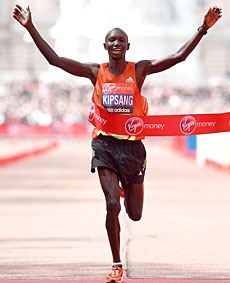
Victah Sailer / PhotoRun
|
WILSON KIPSANG
Age: 30 (Birthdate: 3/15/1982)
PB: 2:03:42, 2011 Frankfurt Marathon
Wilson Kipsang quickly became a household name by proving his talent against the best in the world in order to garner Kenyan Olympic berth. With five career marathons to his name, his marathon accolades include two victories of the Frankfurt Marathon (2010, 2011), a win of the 2011 Otsu Marathon and a well-earned victory of the 2012 London Marathon in what was staged as the Kenyan Olympic team marathon trials. The only marathon he has never won was the 2010 Paris Marathon where he was 3rd.
Kipsang from Kenya is a specialist in the 10k and half marathon, where he has a history of taking on the best in the world. In fact, Kipsang took on Zersenay Tadese at the 2009 World Half Marathon Championships. While Kipsang placed 4th (60:08), the race was won by Tadese who would eventually become the Half Marathon World Record Holder two times over. Kipsang has also raced against Patrick Makau, current Marathon World Record Holder at the 2009 Ras al Khaimah Half Marathon. Although Makau beat Kipsang to the finish by seven seconds, Kipsang's runner up finish was a personal best (58:59). Incidentally, Abel Kirui, the two-time Marathon World Champion (2009 and 2011), was 10th at that same race.
In 2011, with finish times falling below 2:04, Kipsang's 2:04:57 win of the 2010 Frankfurt Marathon wouldn't be fast enough. Kipsang returned to Frankfurt with one goal in mind - to set a new world record. Many speculated "could this be done outside Berlin, London or Dubai?" Kipsang came four seconds short - he finished in 2:03:42 - not enough to unseat the newly crowned Makau; but better than Gebrselassie's former record. With the 2012 London Marathon, Kipsang battled the fastest Kenyans in the world as the race outcome would to decide the Kenyan Olympic team and there were three men who were already faster. Kipsang was careful with his strategy. In 25K of the race, he took to the front and pushed the pace with the pacemakers still on hand. Kipsang slowed in his final solo two miles missing the course record by four seconds, but his breakaway led to victory and earned him a spot on the Kenyan Olympic team (something that his compatriots - the fastest marathoner in the world, the current world record holder, and three time London Marathon champion could not earn).
Why? Kipsang is not only the second fastest man in the field, he was merely four seconds short of setting a new world record in 2011. The 2012 London Marathon was his first time racing in an elite field of such caliber. While he has never raced in a championship race, Kipsang is clearly a favorite.
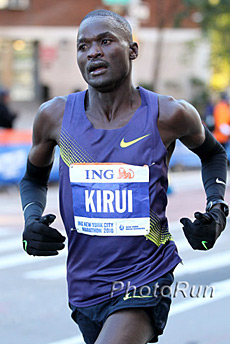
Victah Sailer / PhotoRun
|
ABEL KIRUI
Age: 29 (Birthdate: 6/4/1982)
PB: 2:05:04, 2009 Rotterdam Marathon
Kenyan Abel Kirui's marathon finishes may not stand up to the other top marathoners, but his two victories of the 2009 and 2011 World Championship Marathons guarantees him a berth on the 2012 Kenyan Olympic Marathon team and the well-deserved title of reigning World Champion.
Kirui began his marathoning career with some unremarkable finishes at his first two marathons in 2006 at the Berlin Marathon (2:17:47) and the Singapore Marathon, (2:15:22). A defining moment in his career came when Kirui returned to the 2007 Berlin Marathon as a pacemaker to assist Haile Gebrselassie to his 2:04:26 World Record run. Race officials allowed Kirui to finish the race and he finished as runner-up in 2:06:51. Successful as a pacer, he did the same for "Geb" at the 2008 Dubai Marathon and the 2009 Berlin Marathon. In the interim, Kirui experienced his first victory at the 2008 Vienna Marathon (2:07:38).
Kirui came into form in 2009 beginning with an incredible personal best finish at the 2009 Rotterdam Marathon in 2:05:04. This 3rd place finish put him in the top 10 all-time best marathon performances and was from a historic race which raised the bar in marathoning making 2:05 nearly a standard for top elite fields. Part of this new generation of young Kenyans racing the clock, Kirui who had been "one-to-watch" early in his career solidified his reputation as a serious competitor at the 2009 World Championships in Berlin. He set an early fast pace, then took a strong lead without fading - winning gold on a warm day in a super fast 2:06:54.
Since the world championships, Kirui has had less than stellar performances - 13th at the Sapporo Half Marathon in 64:17, 5th at the London Marathon in 2:08:04 and 9th at the New York City Marathon in 2:13:01 citing the poor performance as a result of contracting typhoid prior to the race. After New York he nursed a tendon and knee injury as well as bouts of malaria and pneumonia.
Kirui returned to racing at the 2011 Paris Half Marathon finishing 7th in a 62:08. He returned to defend his title at the 2011 World Championships in Daegu winning gold once again in a 2:07:38 and nixed his initial plans to pursue a world record time at the 2011 Berlin Marathon. The 2012 London Marathon matched him, not only against one of the deepest international fields he would ever compete in, but against his fellow Kenyans. Far from the fastest Kenyan in the field, Kirui held his own. While he couldn't maintain Kipsang's pace, he held on to finish 6th (2:07:56) beating out 2:04 marathoner and 2011 London champion Emmanuel Mutai.
Why? Kirui is the two time World Champion proving his consistency at criterium championships events.
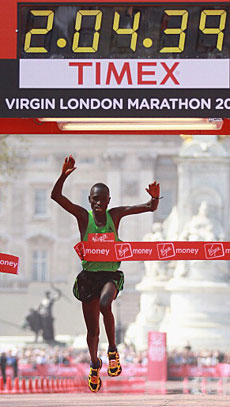
Victah Sailer / PhotoRun
|
EMMANUEL MUTAI
Age: 27 (Birthdate: 10/12/1984)
PB: 2:04:40, 2011 London Marathon
Emmanuel Mutai was not the third man selected for the Kenyan Olympic team, but this former 2011 London Marathon champion would be replacing Moses Mosop who opted out of the Olympics due to an achilles injury. Mutai (not to be confused with 2011 Boston Marathon Champion and fastest man to run 26.2 miles - Geoffrey Mutai) remains the 9th fastest in the world by besting one of the most competitive fields at the 2011 London Marathon in a new course record and personal best in 2:04:40.
With six marathon finishes of 2:06 or faster by age 26, Mutai debuted at the 2007 Rotterdam Marathon, running as a hired pacemaker for Tsegaye Kebede. After fulfilling his pacing duties, he finished the race in 2:13:06 (7th place). Mutai bettered his time in what would essentially be his official marathon debut at the 2007 Amsterdam Marathon later that autumn with a 2:06:29 victory.
This subsequently led to three additional sub-2:07 finishes from the London Marathon (2:06:16 - 2008; 2:06:53 - 2009; and 2:06:23 - 2010); but what brought him to prominence was the 2009 World Championships in Berlin. Mutai held fast to Abel Kirui's pace (Kirui also had been a pacemaker, specifically to Haile Gebrselassie during his world record attempts). Mutai held on to earn silver (2:07:48), contributing to a Kenyan team victory.
At the 2010 London Marathon, Mutai picked off the fading World Champion Abel Kirui to finish second behind Kebede who he once paced. Although one minute off the winner, Mutai ran a new best of 2:06:23. Next, at the 2010 New York City Marathon, Mutai had taken the early role of leader; but was eclipsed when his energy faded in the final mile of the race. He was second in 2:09:18, one minute behind the winner.
Returning with a similar race schedule in 2011, Mutai returned to London. With the absence of 2009 London Champion Sammy Wanjiru, Mutai still had to contend with three-time London champion (2005, 2007, 2008) Martin Lel and 2010 London Champion Tsegaye Kebede, along with the strongest African marathoners gathered. Mutai prevailed this time, winning in a personal best time of 2:04:40.
Mutai went into the 2011 New York City Marathon as a favorite; but the competition was intense. In the field would be fastest marathoner in the world Geoffrey Mutai (of no relation) in addition to his former 2010 London Marathon adversaries. No one was certain who would win, but a fast finish was guaranteed with the caliber of talent on hand. Emmanuel Mutai came in second (2:06:28) - one of the top three to break the previous course record from ten years earlier
At the 2012 London Marathon Mutai returned to defend his title along with the strongest Kenyans assembled at a race in a pseudo-Kenyan Olympic Marathon team trial which was amidst an already deep international field. The race set off on world record pace and the pack did not break until Mutai made an early surge at the 10K in order to break up the lead pack. Mutai expended much energy and when Kipsang surged soon after, Mutai could not go with the leaders. He finished 7th in 2:08:01.
Why? Although Emmanuel Mutai was only a reserve for the Kenyan Olympic Team, he knows race strategy well. And in an event where there will be no pacemakers, he will be able to plan where as Kipsang may not be able to hold back.
THE AMERICANS
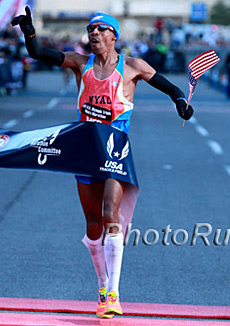
Victah Sailer / PhotoRun
|
MEB KEFLEZIGHI
Age: 37 (Birthdate: 5/5/1975) Asmara, Eritrea
Home: Mammoth Lakes, CA
Coach: Bob Larson
PB: 2:09:13, 2011 New York City Marathon
Meb Keflezighi is "in it to win it". This 2004 Olympic silver medalist and 2009 New York City Champion, returns to the Olympic Marathon for the first time since he won silver at the 2004 Athens Olympics. After numerous setbacks from injury and failing to qualify for the 2008 Beijing Olympics, Keflezighi is the comeback kid.
Now 37 years old, Keflezighi's early career was decorated with accolades in cross-country and the 10,000m. He nabbed the American Record at the 10,000m and gave a solid performance at the 2000 Sydney Olympics. He turned to the marathon distance in 2002 - running his first marathon at the 2002 New York City finishing 9th (2:12:35). His second career marathon was at the 2003 Chicago Marathon where he finished 7th (2:10:03).
Yet, the career changer was in 2004. Keflezighi made the 2004 Athens Olympic team in both the 10,000m and Marathon, but chose to "become a marathoner" and run the one event ending with a silver medal performance at the 2004 Athens Olympics in challenging conditions. A string of successful performances were to follow at the 2004 New York City Marathon (2:09:53, 2nd place), the 2005 New York City Marathon (2:09:56, 3rd place) and 2006 Boston Marathon (same time as New York!: 2:09:56, 3rd place).
Beginning in late 2006, Keflezighi struggled through setbacks from injury and although expected to be a shoo-in to make the 2008 Olympic team, Keflezighi's injuries caused the defending silver medalist to fail to make that team. What was to follow were two injury-ridden years (2007 and 2008), many thought Keflezighi was done. But what made Keflezighi successful in his running - one of the strongest spirits and greatest toughness in the sport - let Keflezighi continue to rebuild, culminating in a 2009 that was filled with personal bests, national championship titles and major event victories.
Keflezighi's 2009 achievements started with a strong win, personal best and National Half Marathon title at the Houston Half Marathon; winning the National Cross-Country title; personal best at the 2009 London Marathon (2:09:21); strong win at the Rock 'n' Roll San Jose Half-Marathon (61:00) culminating with an incredible victory and personal best (2:09:15) at the 2009 New York City Marathon against a tough and deep field on a tough course - also his first marathon victory and the USA Men's Marathon Championship.
Keflezighi ran the 2010 Boston Marathon (2:09:26, 5th place) just eleven seconds shy of his personal best. He next had his sights on defending his title at the 2010 New York City Marathon where he had a personal best on the not-so-flat, fast course; but Keflezighi struggled and finished 6th in 2:11:38. Absent from 2011 spring marathon rosters, he returned to the marathon at the 2011 New York City Marathon where he finished 6th in 2:09:13, a then personal best yet a reminder of work that needed to be done for him to remain competitive in top elite fields.
2012 saw Keflezighi return to the trials seeking redemption. His inability to make the 2008 USA team remained a haunting reminder throughout the past four years despite being an Olympic silver medalist in the marathon (one of the two only American men to ever medal in the Olympic Marathon) and a solid veteran of the distance. He would not make the same mistake; in fact, Keflezighi won his second career marathon at the 2012 Olympic Trials in Houston in a personal best of 2:09:08.
Why? At the risk of sounding repetitive, despite younger upstarts are clocking super fast times, true marathons take such strength and determination that only a few athletes have mastered. Keflezighi is one of them. He has outlasted most of them and in his decade of running and this time at the Trials he can prove that talented guys and good guys can succeed.
|
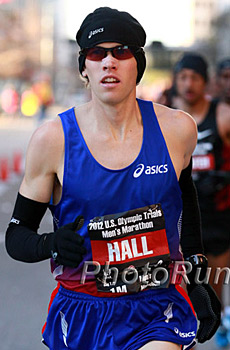
Victah Sailer / PhotoRun
|
RYAN HALL
Age: 29 (Birthdate: 10/14/1982) Kirkland, WA
Home: Flagstaff, AZ
PB: 2:04:58, 2011 Boston Marathon
Leading the roster of top non-African marathoners is Ryan Hall whose running career quickly catapulted him into the upper echelons of the 26.2 mile distance. As the fastest American marathoner currently in competition, Hall, a 2008 Olympian and American half-marathon record holder, began his early career with college track and cross country performances before coming into prominence on the roads.
Hall distinguished himself in long distance with his half-marathon debut at the 2007 Houston Half Marathon where his 59:43 victory was the fastest Half Marathon finish by a non-African born runner. Three months later, Hall ran the 2007 London Marathon in a 2:08:24 - the fastest debut ever by an American-born runner. Having achieved a respectable finish, Hall's strategy stunned those believing in the tradition methodology of marathon race strategy. Hall started in the second pack, briefly caught the leaders; but fell back. Regardless, Hall proved his mettle to the toughest marathoners in the world. And he solidified his place in American distance running despite the detractors, with his victory of the 2008 US Olympic Team Trials Marathon (2:09:02) - merely his second career marathon.
Hall was held in high regard as the 2008 Olympic year approached and he returned to the London Marathon in 2008 finishing in 2:06:17, becoming the second-fastest American marathoner behind Khalid Khannouchi (whose 2:05:38 at the 2002 London Marathon remains the American record).
Despite the success and promise, Hall's luck turned. Hopeful to medal at the 2008 Beijing Olympics, Hall finished tenth in 2:12:33 - the beginning of a number of disappointments to follow in his racing career. Many suspected the mounting pressure to take on the best runners in the world to be the root cause while others believed that his beginners luck had run out. And high hopes at the 2009 Boston Marathon where many wanted Hall to become the first American to win that race since 1983 were dashed.
In his Boston debut, Hall pushed a breakneck world record pace in the opening miles of the event running sub-4:45 miles, but faded in the Newton Hills as the rest of the field surged. Hall nonetheless made a remarkable recovery to finish in third (2:09:40). His next marathon was the 2009 New York City Marathon, again a favorite in the field armed with the lessons from his reckless running in Boston, Hall ran what he felt to be too conservative finishing 4th (2:10:36).
In 2010, Hall returned to Boston and once again pressure mounted for an American, specifically Hall, to win and he believed it as well - studying the Boston course several times leading up to the event. And while earlier in the season a 64:08 (2nd place) from the Rock 'n' Roll Arizona Half-Marathon seemed a minor glitch for this speedy half marathoner; perhaps it was too grand a leap of faith. Hall once again finished 4th (2:08:41). Discouraged, his racing took a hit - 13th place in the Philadelphia Distance Run (43:56) and withdrawal from the 2010 Chicago Marathon field, all hopes for Hall to set a new American Record fell by the wayside. Hall left Coach Terence Mahon and the Mammoth Lakes training camp and began to self-coach.
Hall entered 2011 with a 2nd place finish at the USA Half Marathon Championships (62:20), but a lackluster performance at the 2011 New York City Half Marathon (63:53, 21st place) was reflected by his own admittance post-race when he attributed the performance to "feeling flat" perhaps as a result of running the two events so close to one another.
Third time was the charm as Hall returned to the 2011 Boston Marathon rematching top African runners. While a victory was far off, Hall earned a massive personal best - 2:04:58 (4th place) - restoring confidence which had slowly been eroding away due to the expectations of all around him.
For the 2011 Chicago Marathon, all was silent from Hall before the race despite the silent hopes that he could set a new American record or take a crack at the late Sammy Wanjiru's course record; but Hall's earlier lackluster race season had been indicative of his performances and he was 5th in 2:08:04. Nonetheless, Hall refocused as he entered the 2012 USA Olympic Trials in Houston. Hall was back to form and he started the race at breakneck speed quickly whittling down the lead pack to five by mile 9. The men reached the half marathon mark at 63:25 and by mile 23 it was Hall and Keflezighi who were guaranteed to make the team. Keflezighi sped up for the Trials win and Hall unable to respond to the move finished in 2:09:30.
Why? Hall is America's golden boy. While he has not held consistency in marathon performances, he remains the fastest American in the distance to date. And as overeager as the USA has been to see more Americans best the Africans in the distance, we just need to be patient to see what he is capable of at the Olympics.
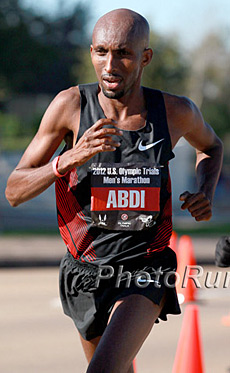
Victah Sailer / PhotoRun
|
ABDI ABDIRAHMAN
Age: 35 (Birthdate: 1/1/1977) Somalia
Home: Phoenix, AZ
Coach: James Li
PB: 2:08:56, 2006 Chicago Marathon
Returning to the Olympics for the 4th time is Abdi Abdirahman, but this will be his first time racing the Olympic Marathon. Best known for his 10,000m times over the past decade; Abdi Abdirahman is every bit a talented marathoner. As the second fastest in the USA Men's Championships field with a 2:08:56 personal best from the 2006 Chicago Marathon, Abdirahman had an early start as a standout in cross-country and track - winning the 5000m and 10000m at the PAC-10 championships. In 2000, the Somalian-born rising star became a US citizen placing third at the 2000 U.S. Olympic Trials in the 10,000m (28:19.08). At the 2000 Games he placed 10th in 10,000m (27:46.17). Abdirahman again represented the USA in the 10,000m at the 2004 and 2008 Olympics, finishing in 15th place twice in Athens (28:26.6) and Beijing (27:52.53) respectively.
Yet, 2004 was when Abdirahman debuted in the marathon at the New York City Marathon. Disappointed at his 14th place finish (2:17:09), he returned to the distance and earning a 5th place at the 2005 New York City Marathon with a 2:11:24 and 4th place at the 2006 Chicago Marathon with a 2:08:56. Confident about his road to the 2008 Beijing Olympics, he went into 2007 with a personal best 2nd place finish of 60:29 at the 2007 New York City Half Marathon - the second fastest half-marathon performance in New York City and was ready to take on New York's Central Park for the 2008 U.S. Olympic Trials. Abdirahman was a favorite for the U.S. marathon team, but had a bad day and dropped out of the race near mile 17 of the criterium course. Despite the performance, he went to the Beijing Games after winning the 10,000m U.S. Olympic trials, becoming a three-time Olympian at age 31.
While performances have been inconsistent due to injuries in 2008 and early 2009, events such as the 2008 New York City Marathon (2:14:17, 6th place), 2009 10,000m National Championships in Eugene, Oregon (28:35, 8th place), 2009 Healthy Kidney 10K (29:02, 11th place) and 2009 New York City Half-Marathon (62:51, 4th place) both held in New York City have been less than stellar. He returned to the marathon at the 2009 New York City Marathon finishing 9th in 2:14:00.
After two years away from the marathon distance, Abdirahman was ready to redeem himself at the 2012 USA Olympic Team Marathon Trials in Houston. He held on to third place finishing in 2:09:47 and earning his Olympic berth.
Why? Abdirahman will enter the 2012 London Olympics solely focused on the Olympic Marathon. Although it looks like Abdirahman had lost steam on the roads in recent years, his win of the USA Half Marathon World Championships could be a certain indicator that the "Black Cactus" is back.
THE ETHIOPIANS
AYELE ABSHERO
DOB: 12/18/1990
PR: 2:04:23, 2012 Dubai Marathon
Ayele Abshero of Ethiopia may seem like an unknown to almost everyone who is a fan of road racing, but that is because he almost is. At a mere 21 years of age, Abshero earned a junior silver medal at the 2008 World Cross Country Championships 8K and was junior gold medalist at the 2009 World Cross Country Championships 8K. While his accolades were mostly in races in Europe and Africa, his resume shows that he has dabbled in various events form cross country, 3,000m-10,000m, to the roads (10k to the marathon).
Despite the growing number of Ethiopian marathon distance talent - names like former World Record Holder Haile Gebrselassie, Tsegay Kebede, Gebre Gebremariam, Deribe Merga, Feyisa Lilisa, Abshero surprised many in the marathon world by winning the 2012 Dubai Marathon in 2:04.23 in January. This was his marathon debut and incidentally the fastest marathon debut ever on a ratified course! And to top it off, he was selected over the aforementioned top marathon talent for the Ethiopian Olympic Marathon team! The Ethiopian Federation was one of the last to announce their team and mentioned that selection was based upon finish times in 2012 performances alone.
Why? Why not? Fresh legs? Beginners luck? There is a reason the Federation has selected Abshero for the Ethiopian Olympic team despite his inexperience in the distance. At the 2008 Beijing Olympics Ethiopians took bronze and 4th place. The world will find out on race day what Abshero the 6th fastest marathoner in the world has to offer.
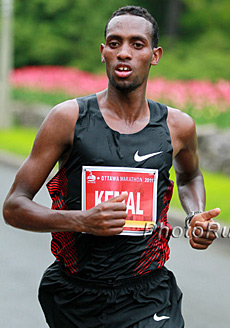
Victah Sailer / PhotoRun
|
DINO SEFER
DOB: 5/28/1988
PR: 2:04:50, 2012 Dubai Marathon
It may seem strange that Dino Sefer was selected to represent the Ethiopian team at the 2012 London Olympics. Sefer with only three career marathons to his name lacks the resume that many other top elite marathoners have. No junior accolades or extensive track and road victories in the past. Defer debuted in 2010 at the Marathon Castellón in an unremarkable 2:20:36 (8th place).
2011 saw a number of personal bests at obscure international road races. He ran a 59:42 half marathon finish at a small race in France leading into his second career marathon. Defer showed improvements in the 26.2 distance knocking 10 minutes off his marathon finish at the 2011 Ottawa Marathon with a 2:10:33 (3rd place).
In 2012 he finished behind Abele Abshero at the Dubai Marathon in another huge personal best - 2:04:50 - which in turn earned him an Olympic berth.
Why? There is no telling what can happen in a marathon. If Sefer's improvements are as stellar as they appear, he will most definitely be a leader in the pack.
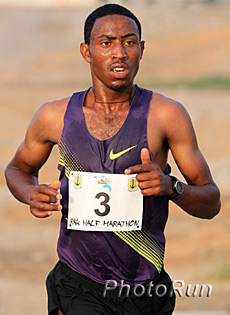
Victah Sailer / PhotoRun
|
GETU FELEKE
DOB: 11/28/1986
PR: 2:04:50, 2012 Rotterdam Marathon
The Rotterdam Marathon is known for putting out some world best times by up and coming marathon talent. Getu Feleke has done just that. His fifth career marathon saw a personal best finish of 2:04:50 (2nd place), merely .02 seconds off the champion in windy and cold conditions.
Feleke debuted at the 2009 Vienna Marathon in 7th place (2:11:42). That autumn, he ran the Amsterdam Marathon finishing 8th (2:09:32). His improvements were consistent in 2010 as he clocked faster times at the Prague Marathon 2:08:04 (4th) and finally earning a victory of the 2010 Amsterdam Marathon in 2:05:44. Feleke then ran the 2012 Rotterdam Marathon becoming the 12th fastest marathoner in the world and earning an Olympic berth.
Why? While Feleke is not the fastest of the Ethiopian Olympic Marathon team, he is the most experienced. It would not be surprising to see his compatriots take cues from him as they all compete in their first Olympics.
| 











